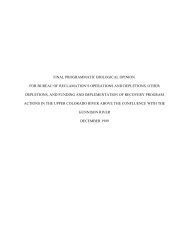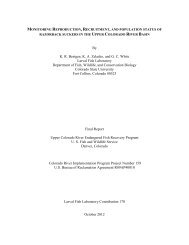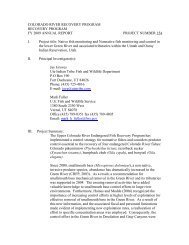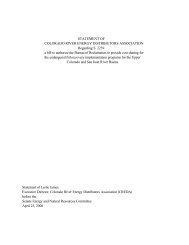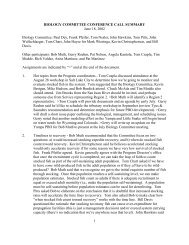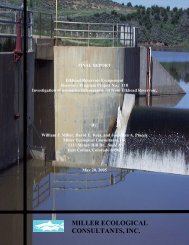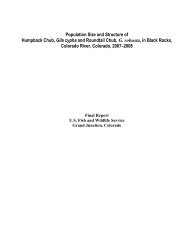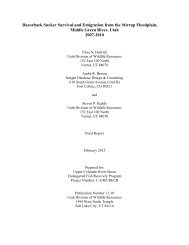riprap - Upper Colorado River Endangered Fish Recovery Program
riprap - Upper Colorado River Endangered Fish Recovery Program
riprap - Upper Colorado River Endangered Fish Recovery Program
Create successful ePaper yourself
Turn your PDF publications into a flip-book with our unique Google optimized e-Paper software.
not be required from historic projects which undergo Section 7 consultation in thefuture.3. The Bureau of Reclamation (BR) and the Western Area Power Administration willoperate projects authorized and funded pursuant to Federal reclamation lawconsistent with its responsibilities under Section 7 of the ESA and with any existingcontracts. No depletion charge will be required on depletions from BR projects aslong as BR continues its contributions to the RIP's annual budget.4. The FWS will assess the impacts of projects that require Section 7 consultation anddetermine if progress toward recovery has been sufficient for the RIP to serve as areasonable and prudent alternative. The FWS will use accomplishments under theRIP as its measure of sufficient progress. The FWS will also consider whether theprobable success of the RIP is compromised as a result of a specific depletion or thecumulative effect of depletions. Support activities (funding, research, informationand education, etc.) in the RIP contribute to sufficient progress to the extent that theyhelp achieve a measurable population response, a measurable improvement inhabitat for the fishes, legal protection of flows needed for recovery, or a reduction inthe threat of immediate extinction. Generally, sufficient progress will be evaluatedseparately for the <strong>Colorado</strong> and Green <strong>River</strong> subbasins (but not individual tributarieswithin each subbasin). However, the FWS will give due consideration to progressthroughout the upper basin in evaluating sufficient progress.5. If sufficient progress is being achieved, biological opinions will identify theactivities and accomplishments of the RIP that support it serving as a reasonable andprudent alternative.6. If sufficient progress is not being achieved, biological opinions for new and historicprojects will be written to identify which action(s) in the RIPRAP must becompleted to avoid jeopardy. Specific recovery actions will be implementedaccording to the schedule identified in the RIPRAP. The FWS will confer with theManagement Committee on the identification of these actions within establishedtimeframes for the Section 7 consultation. For historic projects, these actions willserve as the reasonable and prudent alternative as long as they are completedaccording to the schedule identified in the RIPRAP. For new projects, these actionswill serve as a reasonable and prudent alternative so long as they are completedbefore the impact of the project occurs. The FWS has ultimate authority andresponsibility for determining whether progress is sufficient to enable it to rely uponthe RIP as a reasonable and prudent alternative and identifying actions necessary toavoid jeopardy.7. Certain situations may result in the FWS determining that the recovery action inpreviously rendered biological opinions are no longer serving as a reasonable andprudent alternative. These situations may include, but are not limited, to:a. Critical deadlines for specified recovery actions are missed;b. Specified recovery actions are determined to be infeasible; andc. Significant new information about the needs or population status of thefishes becomes available;8. The FWS will notify the Implementation and Management Committees when asituation may result in the RIP not serving as a reasonable and prudent alternative.3



